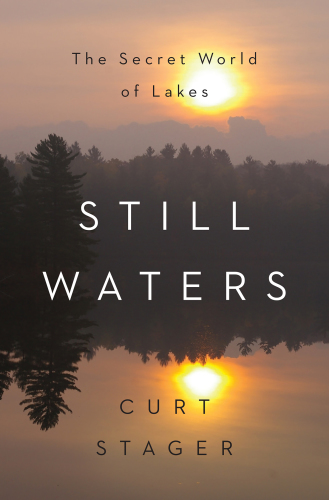
Still Waters
The Secret World of Lakes
کتاب های مرتبط
- اطلاعات
- نقد و بررسی
- دیدگاه کاربران
نقد و بررسی

April 1, 2018
An authoritative, quietly impassioned argument for the ecological stakes in the vitality of our lakes.Stager (Natural Sciences/Paul Smith's Coll.; Your Atomic Self: The Invisible Elements that Connect You to Everything Else in the Universe, 2014, etc.) is a specialist in lake ecology and paleoecology. In his latest book, he offers a composite biography of lakes (and ponds) deep, shallow, grand, and humble, though each with its own individual life story and projected futures. With rueful precision, the author chronicles numerous depredations visited on lakes, often in the name of creating and sustaining fisheries, while also studying the effects of nutrient pollution, soil erosion, species invasions, and extinctions. He reminds us that the interaction of humans with lakes is ancient and that many of the changes exhibited in lakes are naturally occurring evolutionary processes only marginally affected by us. Stager conducts his investigations of lake communities from the "still" waters of the Adirondacks to Walden Pond, from Siberia to the Middle East and Africa, bringing the science to life through historical anecdotes and environmental observations that are measured and fair. However, the author is less successful in some of the descriptive passages that attempt to lend atmosphere, though he achieves a hint of eloquence here and there. For a primer on the "secret world" of lakes and for surprising facts and speculations on the microscopic and macroscopic realms--all carefully assembled and presented--the book is an important contribution to understanding how lakes, beyond their singular beauty, are windows to our primal connections to all life. "There is nothing like a lake to reflect and reveal the world," he writes. Evoking Thoreau and Emerson, Stager also demonstrates that the romantic ideology of wilderness can be counterproductive.Stager corrects many myths and misconceptions regarding what constitutes "healthy" lakes while analyzing troubling issues and threats. Yet he also swims in a pool of abiding human fascination.
COPYRIGHT(2018) Kirkus Reviews, ALL RIGHTS RESERVED.

May 1, 2018
Stager (Deep Future; Your Atomic Self; Field Notes from the Northern Forest) builds on decades of research and observation in the Adirondacks, Tanzania, Siberia, Israel, and beyond in this deep dive into lakes, ponds, and inland seas around the world. Stager is a natural and lucid storyteller, and every chapter of this book is filled with vivid details on the fish, insects, microscopic organisms, and other creatures that make up a particular lake's ecosystem. Stager has previously written on global climate change--work that easily joins the ranks of Rachel Carson's Silent Spring and Elizabeth Kolbert's The Sixth Extinction. He takes a similarly long view of lake ecology here, yet this book has more in common with Henry David Thoreau's Walden. Stager sets out to update Walden's unique blend of genuine scientific information, aesthetic prose, and philosophical insights for the 21st century and more than ably succeeds. The chapter about Walden Pond not only sets the tone for the rest of the volume but also helps make a strong case for the beauty and vulnerability of our lakes. VERDICT An outstanding work of nature and science writing that lingers long after the book is closed. Highly recommended.--Meredith Powers, York Coll., Brooklyn
Copyright 2018 Library Journal, LLC Used with permission.

May 28, 2018
Science professor Stager (Your Atomic Self) declares, “There’s nothing like a lake to reflect and reveal the world,” and he sets out to do the same in this philosophical meditation on lakes, their inhabitants, and the threats they face from human effects on the environment, reaching back thousands of years. He begins this literary tour of lakes he’s studied with Walden Pond, made famous by Henry David Thoreau, which provides a jumping-off point for discussions of diatoms, algae, Thoreau’s importance to readers, debates about the starting date of the Anthropocene, the difference in approaches between environmentalists and scientists, and mortality. Later sections examine and pay tribute to the flora, fauna, and natural laws governing lakes Stager has studied all over the world, from his hometown pond, where he “caught frogs on its banks in summer and skated on it in winter,” to Lake Victoria on the Tanzania-Uganda border, whose drying out (in the climate shifts during the end of the Ice Age) he recounts, drawing on data from sediment cores collected by researchers. All of this leads back to the connectedness between humans and other parts of nature. This contemplative volume, both informative and poetic, makes good on Stager’s intent to “upgrade” Walden “for our own century.” Illus.

























دیدگاه کاربران